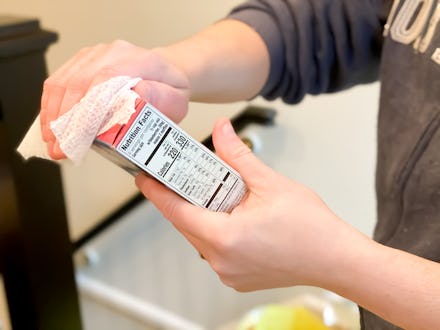There's a very low chance of catching coronavirus from a surface or an animal, the CDC reports

I’ve been wiping down my phone with rubbing alcohol twice a day for months. It’s not that anyone else uses it, it’s just that it’s usually in my hand and someone could have breathed on it. I’ve also been a little less snuggly with my fur family out of an abundance of (potentially) irrational) caution. It’s not time to totally stop cleaning our phones — ew — but it is time to stop avoiding your cat. According to the updated Center for Disease Control and Prevention (CDC) guidelines on how the novel coronavirus spreads, you probably won’t catch COVID-19 by touching a contaminated surface or from animals.
The CDC updated their recommendations for individuals about how to prevent spreading the novel coronavirus Thursday and the most noteworthy change was the addition, in bold type, of two sentences. One says, “The virus can be transmitted easily between people,” and the other states, “the virus does not spread easily other ways.” The intention of the update is to educate people about how they are likely to be infected by coronavirus, so they can pour their energy into social distancing efforts versus focusing too much on more unlikely means of transmission.
Some of the ways that it is unlikely, albeit not theoretically impossible, to become infected include touching contaminated surfaces or objects or being in contact with infected animals, The Washington Post reported. “I wash my hands after handling packages and wipe down shared surfaces with household disinfectant,” Angela Rasmussen, a virologist at the Columbia University Mailman School of Public Health, told the Post. “There’s no harm in that,” she said, but added that we need to remember not to wipe down our food with toxic disinfectants.
Do I need to tell you not to spray your cat with Lysol? I hope not. The CDC update reminds us that if an animal is sick with COVID-19, we need to protect them, but we don’t need to be protected from them. All animals can carry some germs that may not be great for our health, but, as the CDC states in their guidelines,“the risk of animals spreading COVID-19 to people is considered to be low.” Reports about cats and dogs with coronavirus have scared a lot of pet parents, but these fears are mostly unfounded.
The revisions were part of an internal review, CDC spokeswoman Kristen Nordlund told The Washington Post, and are meant to clarify, rather than change. The novel coronavirus is still easily transmitted from person-to-person through respiratory droplets and is easily spread in close quarters, reported The Washington Post. That hasn’t changed, and neither have most CDC recommendations. Avoid close contact with others when you can, mask when you can’t, and as always, wash your damn hands.